My third guest writer is Tricia Nellesen who I met at Sabris school in Sanaa, Yemen, half a year ago and she had an insight to a world which i never will get access to, the one of Yemeni women! Tricia is a reputed cultural anthropologist specializing in Yemen and the Middle East. And after working 11 years as a journalist in the U.S., she returned to graduate school for her PhD. She became interested in studying Yemen after traveling there for language training and have since her first visit, studied the Middle East for four years and Yemen for two. And whilst in Yemen, she learned of the water shortage and wanted to help the people in some way—so she stayed in order to learn more. She is currently in the U.S. writing and compiling her research.
Eyes That Speak: Lifting the Veil of Yemen
By Tricia Nellessen

The day after Christmas 2009, I was surprised to find dozens of messages on my phone. How nice, I thought. People know that I’m home in the U.S. for Christmas. I’d been away for many months, and I had not yet turned on the television. I went about my daily routine intending to listen to the messages later. I sat down in front of the TV and switched on CNN. Suddenly all of the calls made sense. Yemen was being discussed on every channel. One, lone Nigerian man now had my country of temporary residence in the news because he had traveled to Yemen and then attempted to blow up an airliner.
Since then, everyone has become an expert on Yemen. I watch the news and smile as I imagine producers scurrying to find video footage that will capture the essence of the nation. Usually this includes the ever-exotic photo of a fully veiled woman with only her eyes peering out from behind the black cloth. As the images flash across the screen, journalists constantly stumble over names while interviewing experts who seem to have gotten much of their information from Wikipedia. The facts are basic. Yemen is the poorest country in the Middle East. It sits south of Saudi Arabia and has the highest percentage of detainees from any nation housed in Guantanamo Bay. The gender roles are strictly segregated, and women veil their faces in public. Al Qaeda is growing in the region. Oh yes, and Osama Bin Laden’s father was from an area called Hadramawt (which somehow seems to be pronounced Had-ra-mat, as if it were a laundry, on the news). These are the facts that keep being repeated. These are the basics, not the humanity.
I was first introduced to Yemen a couple of years ago at 2am after a number of long flights. I was a thirty-two year old American woman traveling alone. After years as a journalist, I had returned to graduate school for my doctorate in anthropology. Yemen was to be my field site and a perfect place for further language training. As I stepped from the plane, I took a deep breath and wondered what to expect. I climbed down the steep stairs from the 747 to the tarmac and walked across the pavement through the glass doors lined by soldiers with rifles slung over their shoulders. The majority of travelers were Yemenis coming home from trips abroad and my exhausted brain tried to comprehend the foreign words I heard. As I went through customs, the man sitting behind the desk smiled as I spoke to him in Arabic. “You are here to study?” He asked. “Yes”, I replied. “Welcome to Yemen,” he stated in perfect English as he smiled and handed my passport back to me. I walked through the next set of doors and into what would become one of the favorite times in my life.
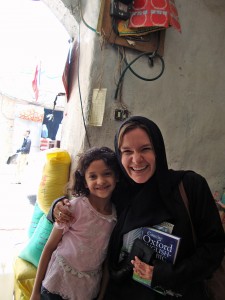
When I’m asked about Yemen, I struggle to explain the spirit of the people. How do I say that I wore a burqa because I chose to? No one would ever think of forcing me to do that there. How do I explain that Hadramawt is a beautiful, historic area with a library filled with ancient documents and some of the world’s best honey and dates? How can I explain to those that have never been there that not everyone identifies themselves as Al-Qaeda, and in actuality Yemen is a nation living in poverty and simply struggling to survive. I’ve traveled around the country and lived with the people, and the only way that I can tell you about Yemen is to tell you of my friends.
I met Noor at a women’s party. These afternoons lasted for hours and were filled with music, dancing, and lots of conversation. We would take our black robes and veils off as soon as we entered the house. Then, the women would drink tea and eat different types of cookies. It was during one of these parties that I met Noor. She was a petite woman close to my age. She smiled sweetly and offered me a seat next to her on the long pillows lying on the floor around a rug in the middle filled with tin trays of food. Noor only spoke Yemeni Arabic, and we struggled to communicate between her dialect and my American accent. Still, we became friends. Once the food was cleared and the music began, Noor pulled me to the middle of the rug. She was the first woman in Yemen to teach me belly dancing. We danced for hours and everyone tried to help my American hips learn the foreign rhythms as we laughed the evening away.
After many such gatherings, I finally learned Noor’s story. We sat drinking sweet Yemeni tea as others danced and I asked her about her family. She said that she had a daughter and her eyes lit with pride. I was surprised to learn that her daughter was seventeen years old. She must have seen my look of confusion, because she quickly explained. Noor had come from a poor village far outside the city. Her father arranged her marriage to a neighbor when she was eleven, and a few years later she gave birth to her daughter. I sipped my sweet tea and digested this information. I asked her delicately about her husband. “He’s dead” was the quick reply. Noor’s face hardened and I knew that the conversation was over. Months later she told me that he was fifty years old when they were married. A few years ago, he passed on. Noor retained his wealth and now remains single. She is proud and intelligent and amazingly independent. She moved her family to the capital city of Sana’a and her daughter attends the university there. Noor even hinted that she might remarry in the future, but this time it would be a man of her choosing.
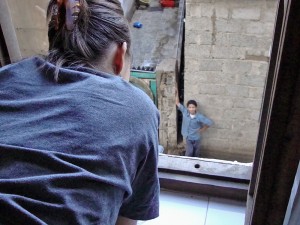
The capital city of Sana’a which hosts the university is a fascinating mix of old and new. I love walking the streets past the ancient walls of Bab Al-Yemen. Bab Al-Yemen literally translates to the “door of Yemen”, and indeed it once was truly this. Two gigantic wooden doors rest eternally open in the middle of a tall stone wall. The wall used to encompass the entire city of Sana’a, but now it only contains what is lovingly referred to as the Old City. I have wandered Bab Al-Yemen for hours. Sometimes I’ve worn the abaya (black robe) and niqab (face veil), and sometimes not. It really depends on whether or not I want to be noticed as a foreigner. When fully veiled, I can blend into the crowd. Why might I not want to be seen as a foreigner? It is certainly not out of fear, but rather because of all the shouts of “Welcome to Yemen” and “Hello, how are you?” If I walk the streets as an American, the children run up and scream “soora, soora?” Soora means photo, and the children always want theirs taken.
On the street where I live in Sana’a, the children from the nearby houses run and play in front of my door. I live on a side street running perpendicular to a main road. The children of my neighborhood know me well. When they are out of school, they play marbles and soccer on the cobblestoned alleyway between our buildings. Mustafa is twelve and is the oldest. He is respected by the others because of this, and sometimes brings his three year old baby brother out with him. Mustafa and his brother were orphaned when their parents were killed in a car accident. His grandfather is raising the boys on a cab driver’s salary. Ahmed is ten and always full of spunk, ready to play soccer. He saves bits of change that he finds and sometimes buys me plastic necklaces. I wear them and he smiles and tells the other boys that I am his wife. Nabil is ten as well and shares his fireworks with me whenever they have them. We toss the little caps on the ground and laugh as they pop. The children’s laughter and shouts are always present outside my door.
Across the street from my house is a café set into a thick mud brick wall. Its pink, metal doors beckon you in for kabob (fried meat balls) and fool (bean soup). Ramsey runs the place and is sits by the door to welcome you. When water became scarce in the countryside, he moved to the city to earn money for his family. Ramsey is the father of six. His wife and children still live on the farm, about four hours away. He works for a month or more before being able to travel the distance to see them. He doesn’t own a car, and the business needs him in order to stay open. I always ask him how his family is, and he’ll pull out his cell phone and show me pictures.
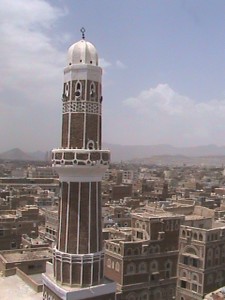
So, you see, as the exotic images of Yemen appear on television screens across the world, I can only think of my friends. There are so many other stories that I could tell which would humanize the stark photos being shown across the world of the tiny little country that no one knew of but that now is in all the headlines. The scenes the news agencies show are from streets that I have walked dozens of times. As others see only mysteriously veiled women and foreign landscapes, I see my friends and paths full of memories. It is true that Al-Qaeda exists in Yemen, but it is also true that the majority of people are simply trying to make a living in a country which was forgotten until this Christmas when one man suddenly brought the spotlight of the world to bear. Yemen has faced Al-Qaeda attacks for years. It sits on the brink of civil war as the South threatens to secede once again, and rebels to the north of Sana’a continue to fight the government forces. Amidst all of this, Yemen is projected to become the first country in the world to suffer a complete lack of groundwater as its aquifers drain and the rains move away from the Arabian Peninsula. Yemen and its people have been, and will continue to be, facing serious challenges.
I sat in Sana’a sipping tea with Michael a few months ago and he asked me what it was like to be a woman living in Yemen. I remember telling him tales of my friends and experiences. Michael understood, as explorers do, that societies are complex and varied. To truly understand a people, one has to delve beneath the obvious and experience the everyday and mundane. To me, the veil has yet to be lifted from Yemen in the eyes of the world. Rather, the information coming out of Yemen from the outside media is vague and unsubstantial because of lack of attention in previous years and the newly escalating security situation with Al-Qaeda in the Arabian Peninsula. It is my hope, as days move forward, that a distinction will be made between the people and the destructive elements driving Yemen towards becoming a failed state.
Tricia can be contacted here!
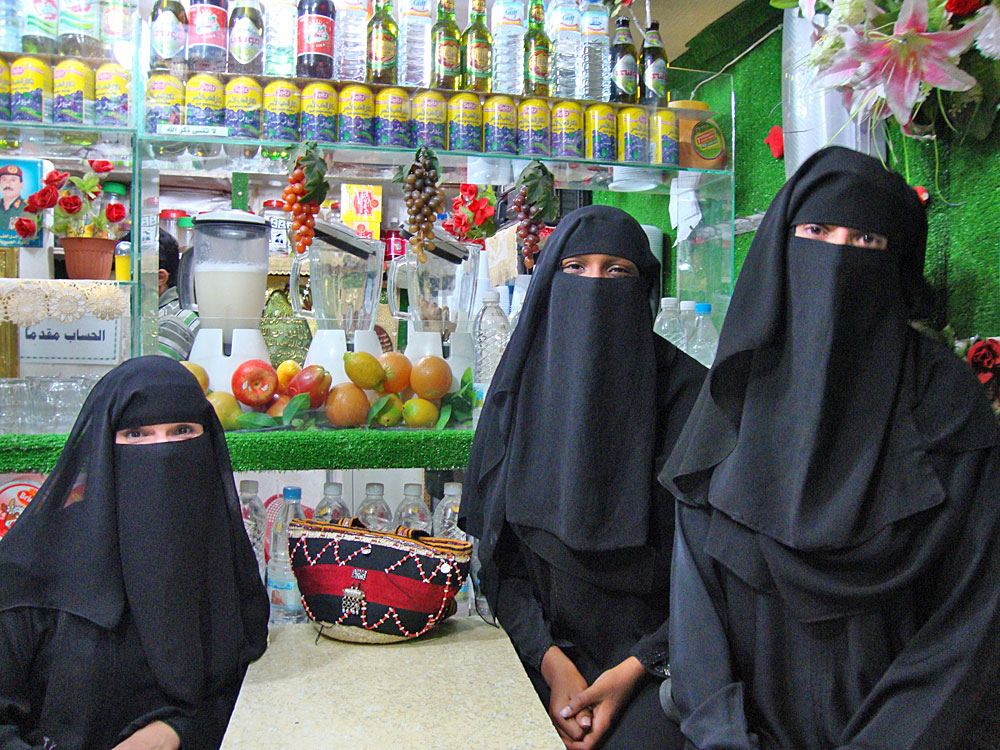
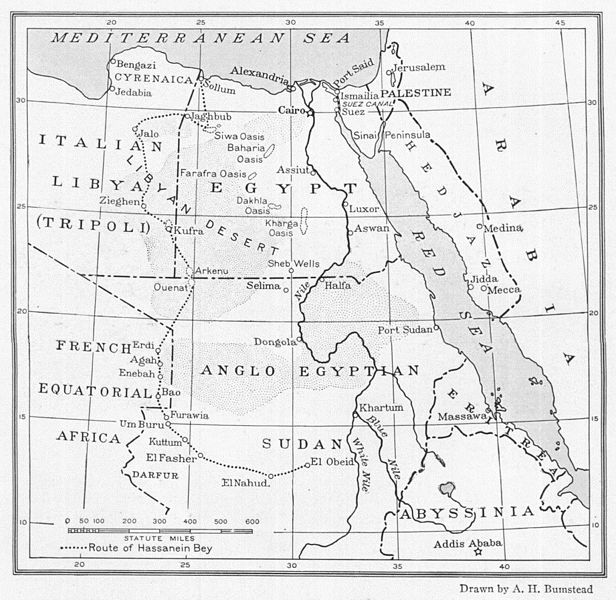
great article trish. You are gifted! I’m sure you could write a great book about your experience. I appreciate it very much because I know how the media can give people an impression of a place based on a few bad apples. its the same in saudi. with all the well known problems, some people miss the fact that deep down, many if not most people, just want to earn a living and raise there family. Because my arabic is poor I havent been able to see saudi from inside and it leaves me wanting! i would love to work in a small town where people dont speak much or any english. well see what happens. thanks for enlightening me to what are already knew deep down. that people are the same all over and that few go to extremes. the extremes are what sell, not the mundane everyday life, but your writing shows that even the seemingly mundane does enrich our experience.
assalamualaikum.
i from malaysia.how i want to oder niqab yemen?